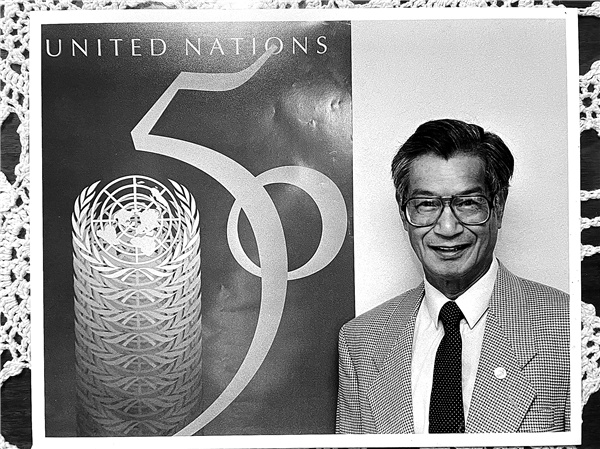

That assignment allowed Huang to further pursue studies in international relations at George Washington University, at a time when civil war was being fought in China between the Communists and Nationalists. He gained his degree in 1949, the year the People's Republic of China was founded. In early 1952 Huang joined the UN "in its new Secretariat building" in New York, after beating his fellow contestants in a highly competitive exam.
"I found to my surprise that quite a few Chinese colleagues were ready to resign and take their families back to China to participate in its reconstruction," says Huang, who acknowledges "a feeling of being abandoned by the new government" as visits to China became no longer practical.
The Chinese Government started to allow Chinese staff members in the UN to use the UN laissez-passer, he said, instead of a passport, to enter China around 1970, the year before Resolution No 2758 was adopted. When Huang returned with his family in the summer of 1972, he found himself "a guest of Chairman Mao".
"In Hangzhou we stopped at a tea shop and tasted some tea," Huang says. "My children wanted to buy a porcelain teacup with store inscription. The clerk said he had to check with the manager. The manager's answer was: 'Sure, they are the guests of Chairman Mao'."
Tang, who was then the highest-ranking Chinese from the PRC in the UN Secretariat, made a point of encouraging such trips.
Born in southern Guangdong province, he migrated to the US with his parents in the 1920s, before returning to China to attend high school and university, where he joined the Chinese Communist Party in 1931.
Back in the US in 1933, Tang studied Western contemporary history at the University of California, Berkeley. Throughout the 1930s and 40s he remained an active Party member, co-founding the Chinese-language newspaper China Daily News in New York to raise awareness and support among overseas Chinese about the plight and struggle of their home country.
The paper was founded with the support of the Chinese Hand Laundry Alliance, a labor organization dedicated to improving the lives of those in an occupation heavily identified with Chinese Americans in the first half of the 20th century. (Lee's parents opened their first laundry in New York in 1946, after his father was discharged from the US Army Air Corps at the end of the World War II.)
A co-founder of the paper was Ji Gongquan, whose son Ji Chaozhu, with Tang's daughter Nancy Tang (Tang Wensheng), acted as Mao Zedong's most-trusted interpreters during the 1970s. Nancy Tang can be seen sitting behind Huang Hua when the PRC delegation took its place in the General Assembly in New York on Nov 15, 1971, three weeks after the resolution. Both interpreted during president Richard Nixon's visit three months later. Ji Chaozhu also served as UN under secretary-general for development support and management services from 1991 to 1996, a "distinguished leader with energy and vision", to quote a UN tribute made when he died in April last year.
Through his education, as well as his close involvement with both the alliance and the newspaper, Tang Ming-chao straddled the dual worlds of Chinese in the US at the time: one was inhabited by the parents of Lee and Lai and their fellow Chinese laborers; the other by Tsien and Huang and their relatively small circle of highly educated, elite Chinese.
Above all, he understood the cultures and concerns of both groups, as well as their longing to reconnect with China.
Realizing the key role he played in bridge-building, Tang had "gone across the street to talk to people",Yuan says, referring to his relentless effort to win hearts and minds, which he also did through "his even temper and his genuine open-minded and democratic administration", to quote Yuan's mother Tsien.